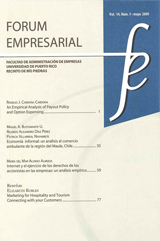Abstract
The increased use of stock options as a compensation component and the subsequent failure of firms where their use was prevalent forced both Congress and the Financial Accounting Standards Board (FASB) to enact new legislation and regulations in 2002. Among other things, the new legislation required corporations to disclose more information on their financial statements and initially to recognize voluntarily stock option grants as an expense on their financial statements. In 2004 option expensing became mandatory. This investigation uses Tobit regression models to examine whether there is a change in the payout policy (use a firm‘s cash to pay dividends to its stockholders or to repurchase outstanding shares from its shareholders) in a group of firms after announcing their voluntary decision to expense their stock options. The expected increases in the payment of dividends or share repurchases did not occur. Firms seem to have reacted to the required option expensing with other changes in their equity compensation plans such as accelerating the vesting of its options or by modifying the terms of its option grants.
This work is licensed under a Creative Commons Attribution-NonCommercial-ShareAlike 4.0 International License.
Copyright (c) 2016 Fórum Empresarial
Downloads
Download data is not yet available.

